Impact of Communication Skills Training: A Case Study of Hotel Hilton
VerifiedAdded on 2023/04/25
|30
|10108
|162
Case Study
AI Summary
This case study explores the impact of communication skills training and development within the hospitality industry, focusing on Hotel Hilton. It identifies the significance of communication skills in customer service and investigates factors affecting training, such as employee schedules, dispersed workforce, and varied learning habits. The research employs a positivism philosophy, deductive approach, and survey research strategy, collecting data from 50 Hilton managers. Findings indicate that communication skills training positively impacts employee skills, knowledge, and customer handling abilities. Challenges include hectic work schedules, dispersed workforce, individual learning preferences, and seasonal demands. Recommendations include virtual platforms and tailored learning approaches. The study concludes that effective communication skills training is crucial for enhancing customer service and achieving a competitive advantage in the hospitality sector. Desklib provides access to similar case studies and solved assignments for students.
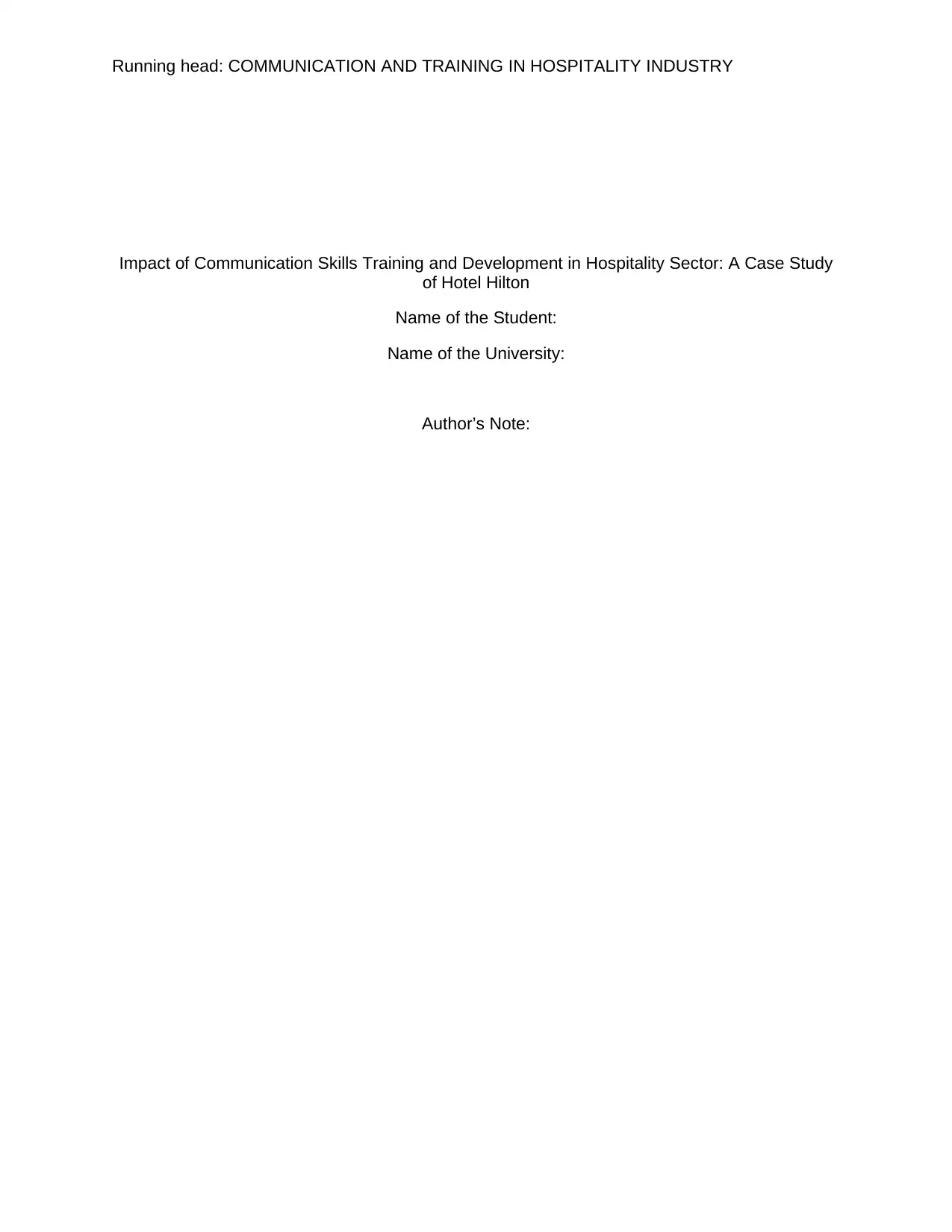
Running head: COMMUNICATION AND TRAINING IN HOSPITALITY INDUSTRY
Impact of Communication Skills Training and Development in Hospitality Sector: A Case Study
of Hotel Hilton
Name of the Student:
Name of the University:
Author’s Note:
Impact of Communication Skills Training and Development in Hospitality Sector: A Case Study
of Hotel Hilton
Name of the Student:
Name of the University:
Author’s Note:
Paraphrase This Document
Need a fresh take? Get an instant paraphrase of this document with our AI Paraphraser
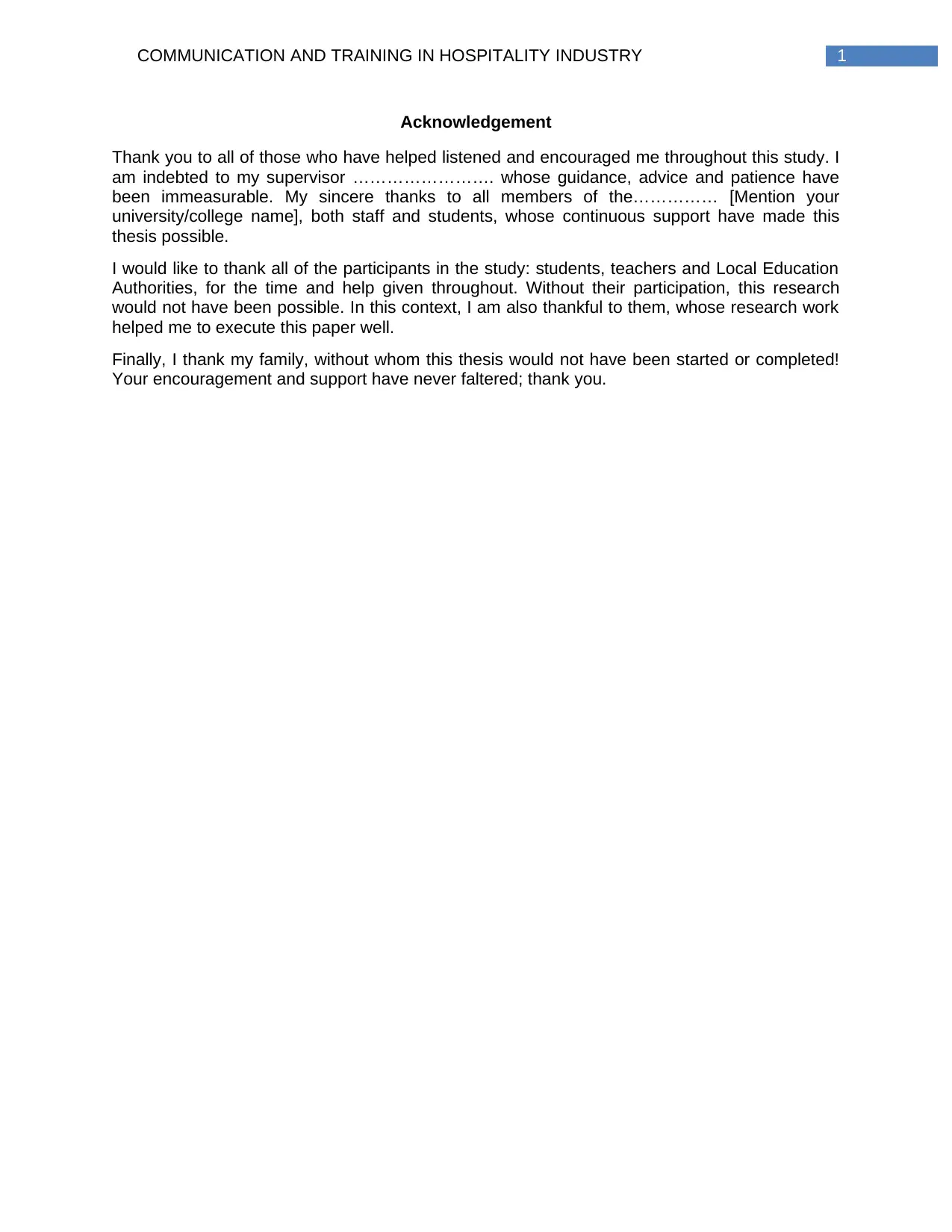
1COMMUNICATION AND TRAINING IN HOSPITALITY INDUSTRY
Acknowledgement
Thank you to all of those who have helped listened and encouraged me throughout this study. I
am indebted to my supervisor ……………………. whose guidance, advice and patience have
been immeasurable. My sincere thanks to all members of the…………… [Mention your
university/college name], both staff and students, whose continuous support have made this
thesis possible.
I would like to thank all of the participants in the study: students, teachers and Local Education
Authorities, for the time and help given throughout. Without their participation, this research
would not have been possible. In this context, I am also thankful to them, whose research work
helped me to execute this paper well.
Finally, I thank my family, without whom this thesis would not have been started or completed!
Your encouragement and support have never faltered; thank you.
Acknowledgement
Thank you to all of those who have helped listened and encouraged me throughout this study. I
am indebted to my supervisor ……………………. whose guidance, advice and patience have
been immeasurable. My sincere thanks to all members of the…………… [Mention your
university/college name], both staff and students, whose continuous support have made this
thesis possible.
I would like to thank all of the participants in the study: students, teachers and Local Education
Authorities, for the time and help given throughout. Without their participation, this research
would not have been possible. In this context, I am also thankful to them, whose research work
helped me to execute this paper well.
Finally, I thank my family, without whom this thesis would not have been started or completed!
Your encouragement and support have never faltered; thank you.
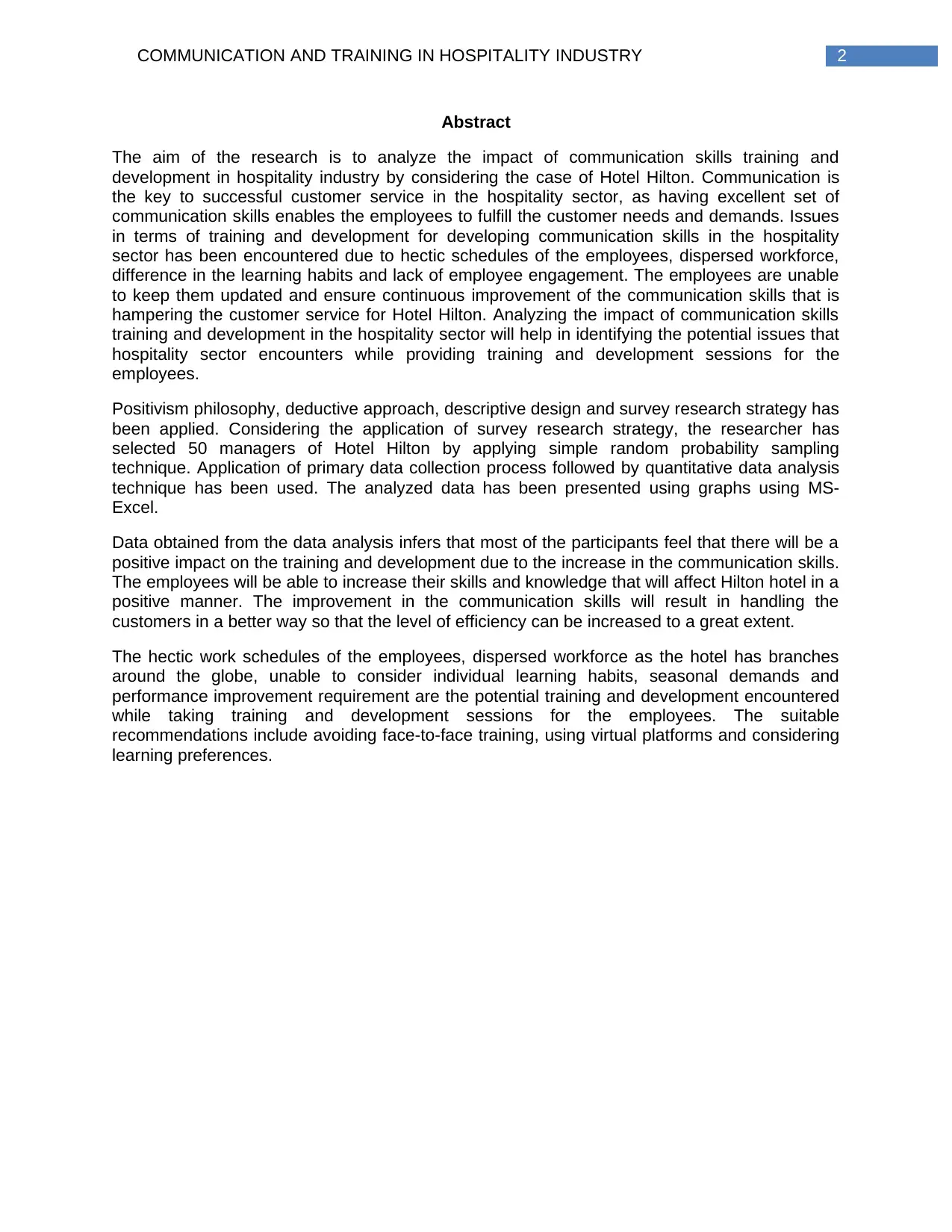
2COMMUNICATION AND TRAINING IN HOSPITALITY INDUSTRY
Abstract
The aim of the research is to analyze the impact of communication skills training and
development in hospitality industry by considering the case of Hotel Hilton. Communication is
the key to successful customer service in the hospitality sector, as having excellent set of
communication skills enables the employees to fulfill the customer needs and demands. Issues
in terms of training and development for developing communication skills in the hospitality
sector has been encountered due to hectic schedules of the employees, dispersed workforce,
difference in the learning habits and lack of employee engagement. The employees are unable
to keep them updated and ensure continuous improvement of the communication skills that is
hampering the customer service for Hotel Hilton. Analyzing the impact of communication skills
training and development in the hospitality sector will help in identifying the potential issues that
hospitality sector encounters while providing training and development sessions for the
employees.
Positivism philosophy, deductive approach, descriptive design and survey research strategy has
been applied. Considering the application of survey research strategy, the researcher has
selected 50 managers of Hotel Hilton by applying simple random probability sampling
technique. Application of primary data collection process followed by quantitative data analysis
technique has been used. The analyzed data has been presented using graphs using MS-
Excel.
Data obtained from the data analysis infers that most of the participants feel that there will be a
positive impact on the training and development due to the increase in the communication skills.
The employees will be able to increase their skills and knowledge that will affect Hilton hotel in a
positive manner. The improvement in the communication skills will result in handling the
customers in a better way so that the level of efficiency can be increased to a great extent.
The hectic work schedules of the employees, dispersed workforce as the hotel has branches
around the globe, unable to consider individual learning habits, seasonal demands and
performance improvement requirement are the potential training and development encountered
while taking training and development sessions for the employees. The suitable
recommendations include avoiding face-to-face training, using virtual platforms and considering
learning preferences.
Abstract
The aim of the research is to analyze the impact of communication skills training and
development in hospitality industry by considering the case of Hotel Hilton. Communication is
the key to successful customer service in the hospitality sector, as having excellent set of
communication skills enables the employees to fulfill the customer needs and demands. Issues
in terms of training and development for developing communication skills in the hospitality
sector has been encountered due to hectic schedules of the employees, dispersed workforce,
difference in the learning habits and lack of employee engagement. The employees are unable
to keep them updated and ensure continuous improvement of the communication skills that is
hampering the customer service for Hotel Hilton. Analyzing the impact of communication skills
training and development in the hospitality sector will help in identifying the potential issues that
hospitality sector encounters while providing training and development sessions for the
employees.
Positivism philosophy, deductive approach, descriptive design and survey research strategy has
been applied. Considering the application of survey research strategy, the researcher has
selected 50 managers of Hotel Hilton by applying simple random probability sampling
technique. Application of primary data collection process followed by quantitative data analysis
technique has been used. The analyzed data has been presented using graphs using MS-
Excel.
Data obtained from the data analysis infers that most of the participants feel that there will be a
positive impact on the training and development due to the increase in the communication skills.
The employees will be able to increase their skills and knowledge that will affect Hilton hotel in a
positive manner. The improvement in the communication skills will result in handling the
customers in a better way so that the level of efficiency can be increased to a great extent.
The hectic work schedules of the employees, dispersed workforce as the hotel has branches
around the globe, unable to consider individual learning habits, seasonal demands and
performance improvement requirement are the potential training and development encountered
while taking training and development sessions for the employees. The suitable
recommendations include avoiding face-to-face training, using virtual platforms and considering
learning preferences.
⊘ This is a preview!⊘
Do you want full access?
Subscribe today to unlock all pages.

Trusted by 1+ million students worldwide
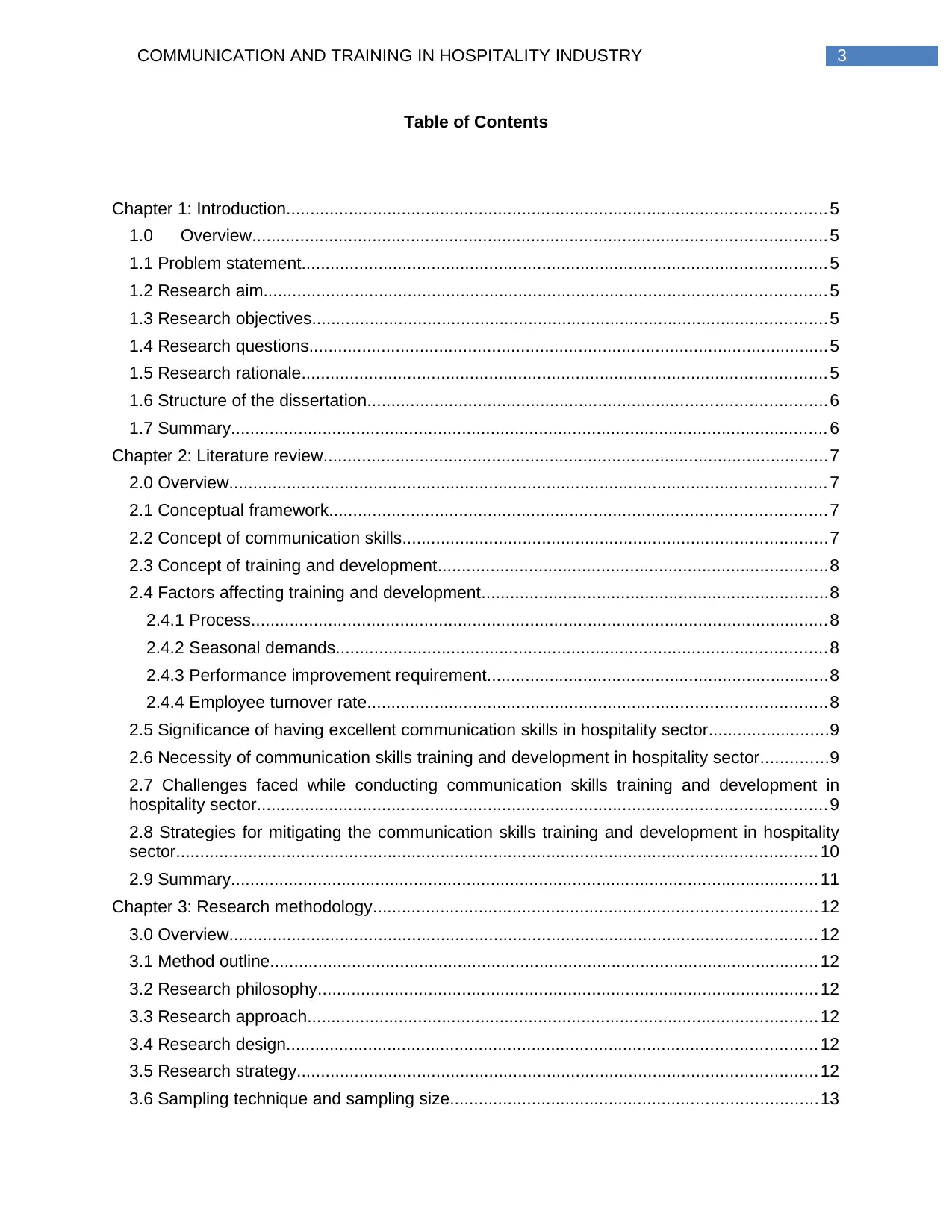
3COMMUNICATION AND TRAINING IN HOSPITALITY INDUSTRY
Table of Contents
Chapter 1: Introduction................................................................................................................ 5
1.0 Overview....................................................................................................................... 5
1.1 Problem statement............................................................................................................. 5
1.2 Research aim..................................................................................................................... 5
1.3 Research objectives...........................................................................................................5
1.4 Research questions............................................................................................................5
1.5 Research rationale............................................................................................................. 5
1.6 Structure of the dissertation...............................................................................................6
1.7 Summary............................................................................................................................ 6
Chapter 2: Literature review.........................................................................................................7
2.0 Overview............................................................................................................................ 7
2.1 Conceptual framework.......................................................................................................7
2.2 Concept of communication skills........................................................................................7
2.3 Concept of training and development.................................................................................8
2.4 Factors affecting training and development........................................................................8
2.4.1 Process........................................................................................................................ 8
2.4.2 Seasonal demands......................................................................................................8
2.4.3 Performance improvement requirement.......................................................................8
2.4.4 Employee turnover rate...............................................................................................8
2.5 Significance of having excellent communication skills in hospitality sector.........................9
2.6 Necessity of communication skills training and development in hospitality sector..............9
2.7 Challenges faced while conducting communication skills training and development in
hospitality sector...................................................................................................................... 9
2.8 Strategies for mitigating the communication skills training and development in hospitality
sector..................................................................................................................................... 10
2.9 Summary.......................................................................................................................... 11
Chapter 3: Research methodology............................................................................................12
3.0 Overview.......................................................................................................................... 12
3.1 Method outline.................................................................................................................. 12
3.2 Research philosophy........................................................................................................12
3.3 Research approach..........................................................................................................12
3.4 Research design.............................................................................................................. 12
3.5 Research strategy............................................................................................................ 12
3.6 Sampling technique and sampling size............................................................................13
Table of Contents
Chapter 1: Introduction................................................................................................................ 5
1.0 Overview....................................................................................................................... 5
1.1 Problem statement............................................................................................................. 5
1.2 Research aim..................................................................................................................... 5
1.3 Research objectives...........................................................................................................5
1.4 Research questions............................................................................................................5
1.5 Research rationale............................................................................................................. 5
1.6 Structure of the dissertation...............................................................................................6
1.7 Summary............................................................................................................................ 6
Chapter 2: Literature review.........................................................................................................7
2.0 Overview............................................................................................................................ 7
2.1 Conceptual framework.......................................................................................................7
2.2 Concept of communication skills........................................................................................7
2.3 Concept of training and development.................................................................................8
2.4 Factors affecting training and development........................................................................8
2.4.1 Process........................................................................................................................ 8
2.4.2 Seasonal demands......................................................................................................8
2.4.3 Performance improvement requirement.......................................................................8
2.4.4 Employee turnover rate...............................................................................................8
2.5 Significance of having excellent communication skills in hospitality sector.........................9
2.6 Necessity of communication skills training and development in hospitality sector..............9
2.7 Challenges faced while conducting communication skills training and development in
hospitality sector...................................................................................................................... 9
2.8 Strategies for mitigating the communication skills training and development in hospitality
sector..................................................................................................................................... 10
2.9 Summary.......................................................................................................................... 11
Chapter 3: Research methodology............................................................................................12
3.0 Overview.......................................................................................................................... 12
3.1 Method outline.................................................................................................................. 12
3.2 Research philosophy........................................................................................................12
3.3 Research approach..........................................................................................................12
3.4 Research design.............................................................................................................. 12
3.5 Research strategy............................................................................................................ 12
3.6 Sampling technique and sampling size............................................................................13
Paraphrase This Document
Need a fresh take? Get an instant paraphrase of this document with our AI Paraphraser
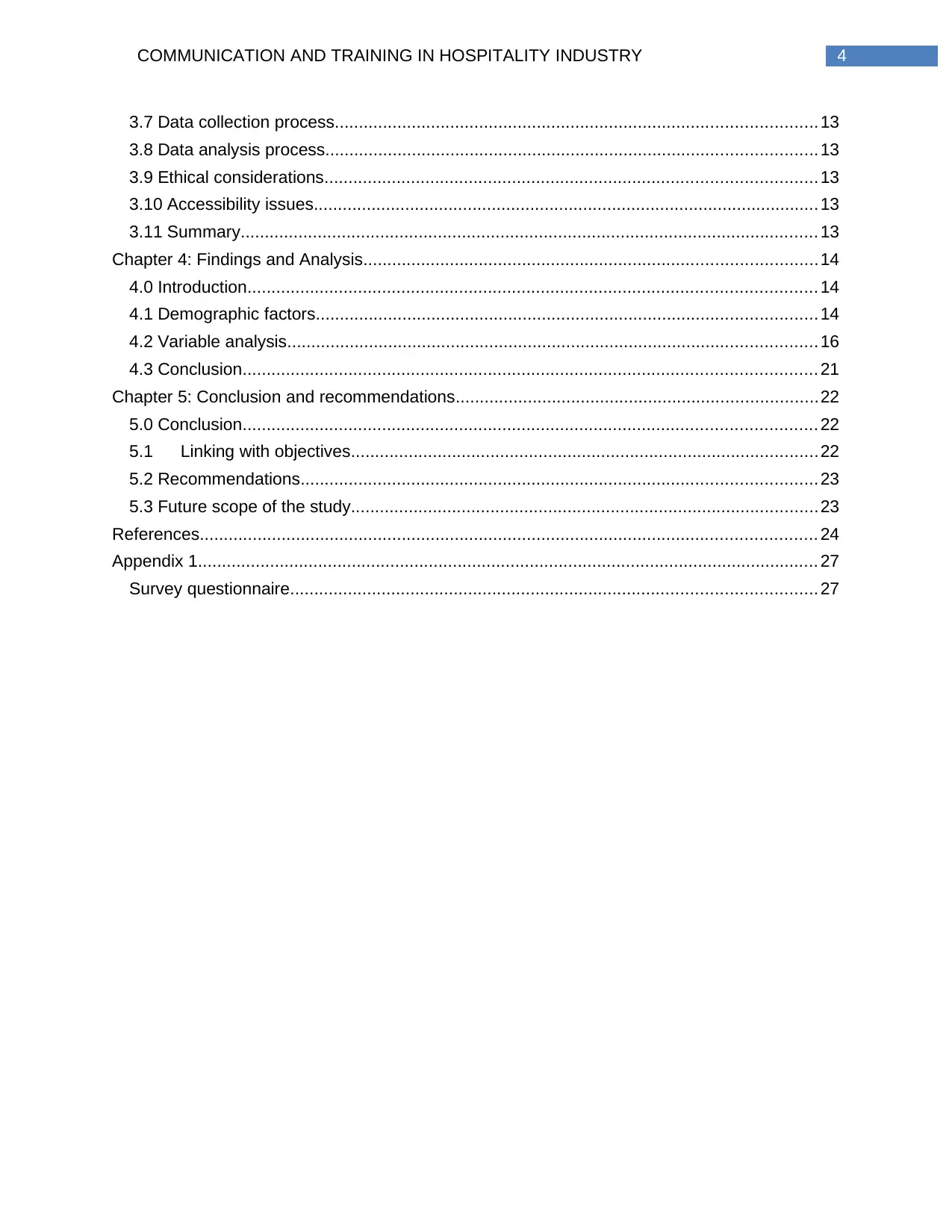
4COMMUNICATION AND TRAINING IN HOSPITALITY INDUSTRY
3.7 Data collection process....................................................................................................13
3.8 Data analysis process......................................................................................................13
3.9 Ethical considerations......................................................................................................13
3.10 Accessibility issues.........................................................................................................13
3.11 Summary........................................................................................................................ 13
Chapter 4: Findings and Analysis..............................................................................................14
4.0 Introduction...................................................................................................................... 14
4.1 Demographic factors........................................................................................................14
4.2 Variable analysis.............................................................................................................. 16
4.3 Conclusion....................................................................................................................... 21
Chapter 5: Conclusion and recommendations...........................................................................22
5.0 Conclusion....................................................................................................................... 22
5.1 Linking with objectives.................................................................................................22
5.2 Recommendations........................................................................................................... 23
5.3 Future scope of the study.................................................................................................23
References................................................................................................................................ 24
Appendix 1................................................................................................................................. 27
Survey questionnaire............................................................................................................. 27
3.7 Data collection process....................................................................................................13
3.8 Data analysis process......................................................................................................13
3.9 Ethical considerations......................................................................................................13
3.10 Accessibility issues.........................................................................................................13
3.11 Summary........................................................................................................................ 13
Chapter 4: Findings and Analysis..............................................................................................14
4.0 Introduction...................................................................................................................... 14
4.1 Demographic factors........................................................................................................14
4.2 Variable analysis.............................................................................................................. 16
4.3 Conclusion....................................................................................................................... 21
Chapter 5: Conclusion and recommendations...........................................................................22
5.0 Conclusion....................................................................................................................... 22
5.1 Linking with objectives.................................................................................................22
5.2 Recommendations........................................................................................................... 23
5.3 Future scope of the study.................................................................................................23
References................................................................................................................................ 24
Appendix 1................................................................................................................................. 27
Survey questionnaire............................................................................................................. 27
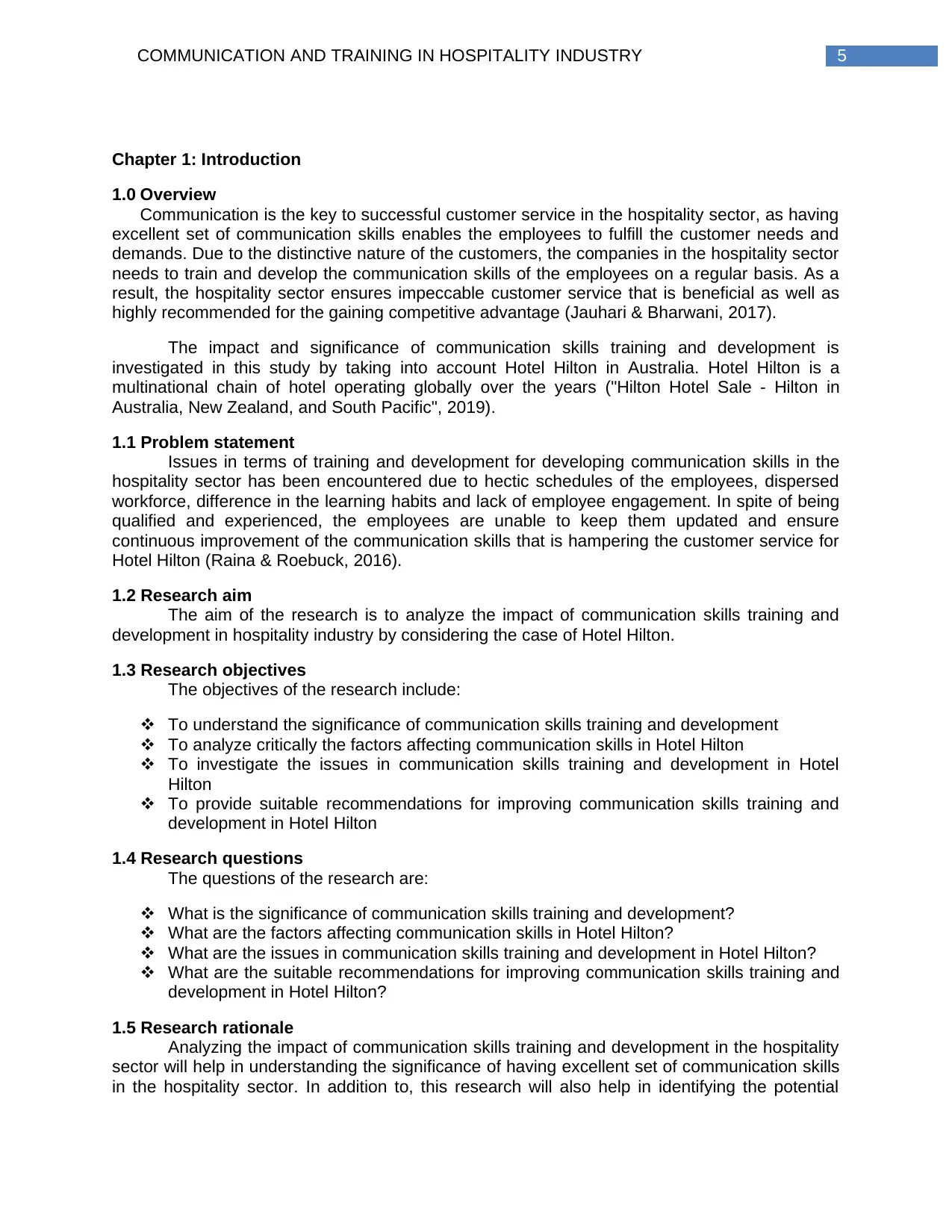
5COMMUNICATION AND TRAINING IN HOSPITALITY INDUSTRY
Chapter 1: Introduction
1.0 Overview
Communication is the key to successful customer service in the hospitality sector, as having
excellent set of communication skills enables the employees to fulfill the customer needs and
demands. Due to the distinctive nature of the customers, the companies in the hospitality sector
needs to train and develop the communication skills of the employees on a regular basis. As a
result, the hospitality sector ensures impeccable customer service that is beneficial as well as
highly recommended for the gaining competitive advantage (Jauhari & Bharwani, 2017).
The impact and significance of communication skills training and development is
investigated in this study by taking into account Hotel Hilton in Australia. Hotel Hilton is a
multinational chain of hotel operating globally over the years ("Hilton Hotel Sale - Hilton in
Australia, New Zealand, and South Pacific", 2019).
1.1 Problem statement
Issues in terms of training and development for developing communication skills in the
hospitality sector has been encountered due to hectic schedules of the employees, dispersed
workforce, difference in the learning habits and lack of employee engagement. In spite of being
qualified and experienced, the employees are unable to keep them updated and ensure
continuous improvement of the communication skills that is hampering the customer service for
Hotel Hilton (Raina & Roebuck, 2016).
1.2 Research aim
The aim of the research is to analyze the impact of communication skills training and
development in hospitality industry by considering the case of Hotel Hilton.
1.3 Research objectives
The objectives of the research include:
To understand the significance of communication skills training and development
To analyze critically the factors affecting communication skills in Hotel Hilton
To investigate the issues in communication skills training and development in Hotel
Hilton
To provide suitable recommendations for improving communication skills training and
development in Hotel Hilton
1.4 Research questions
The questions of the research are:
What is the significance of communication skills training and development?
What are the factors affecting communication skills in Hotel Hilton?
What are the issues in communication skills training and development in Hotel Hilton?
What are the suitable recommendations for improving communication skills training and
development in Hotel Hilton?
1.5 Research rationale
Analyzing the impact of communication skills training and development in the hospitality
sector will help in understanding the significance of having excellent set of communication skills
in the hospitality sector. In addition to, this research will also help in identifying the potential
Chapter 1: Introduction
1.0 Overview
Communication is the key to successful customer service in the hospitality sector, as having
excellent set of communication skills enables the employees to fulfill the customer needs and
demands. Due to the distinctive nature of the customers, the companies in the hospitality sector
needs to train and develop the communication skills of the employees on a regular basis. As a
result, the hospitality sector ensures impeccable customer service that is beneficial as well as
highly recommended for the gaining competitive advantage (Jauhari & Bharwani, 2017).
The impact and significance of communication skills training and development is
investigated in this study by taking into account Hotel Hilton in Australia. Hotel Hilton is a
multinational chain of hotel operating globally over the years ("Hilton Hotel Sale - Hilton in
Australia, New Zealand, and South Pacific", 2019).
1.1 Problem statement
Issues in terms of training and development for developing communication skills in the
hospitality sector has been encountered due to hectic schedules of the employees, dispersed
workforce, difference in the learning habits and lack of employee engagement. In spite of being
qualified and experienced, the employees are unable to keep them updated and ensure
continuous improvement of the communication skills that is hampering the customer service for
Hotel Hilton (Raina & Roebuck, 2016).
1.2 Research aim
The aim of the research is to analyze the impact of communication skills training and
development in hospitality industry by considering the case of Hotel Hilton.
1.3 Research objectives
The objectives of the research include:
To understand the significance of communication skills training and development
To analyze critically the factors affecting communication skills in Hotel Hilton
To investigate the issues in communication skills training and development in Hotel
Hilton
To provide suitable recommendations for improving communication skills training and
development in Hotel Hilton
1.4 Research questions
The questions of the research are:
What is the significance of communication skills training and development?
What are the factors affecting communication skills in Hotel Hilton?
What are the issues in communication skills training and development in Hotel Hilton?
What are the suitable recommendations for improving communication skills training and
development in Hotel Hilton?
1.5 Research rationale
Analyzing the impact of communication skills training and development in the hospitality
sector will help in understanding the significance of having excellent set of communication skills
in the hospitality sector. In addition to, this research will also help in identifying the potential
⊘ This is a preview!⊘
Do you want full access?
Subscribe today to unlock all pages.

Trusted by 1+ million students worldwide
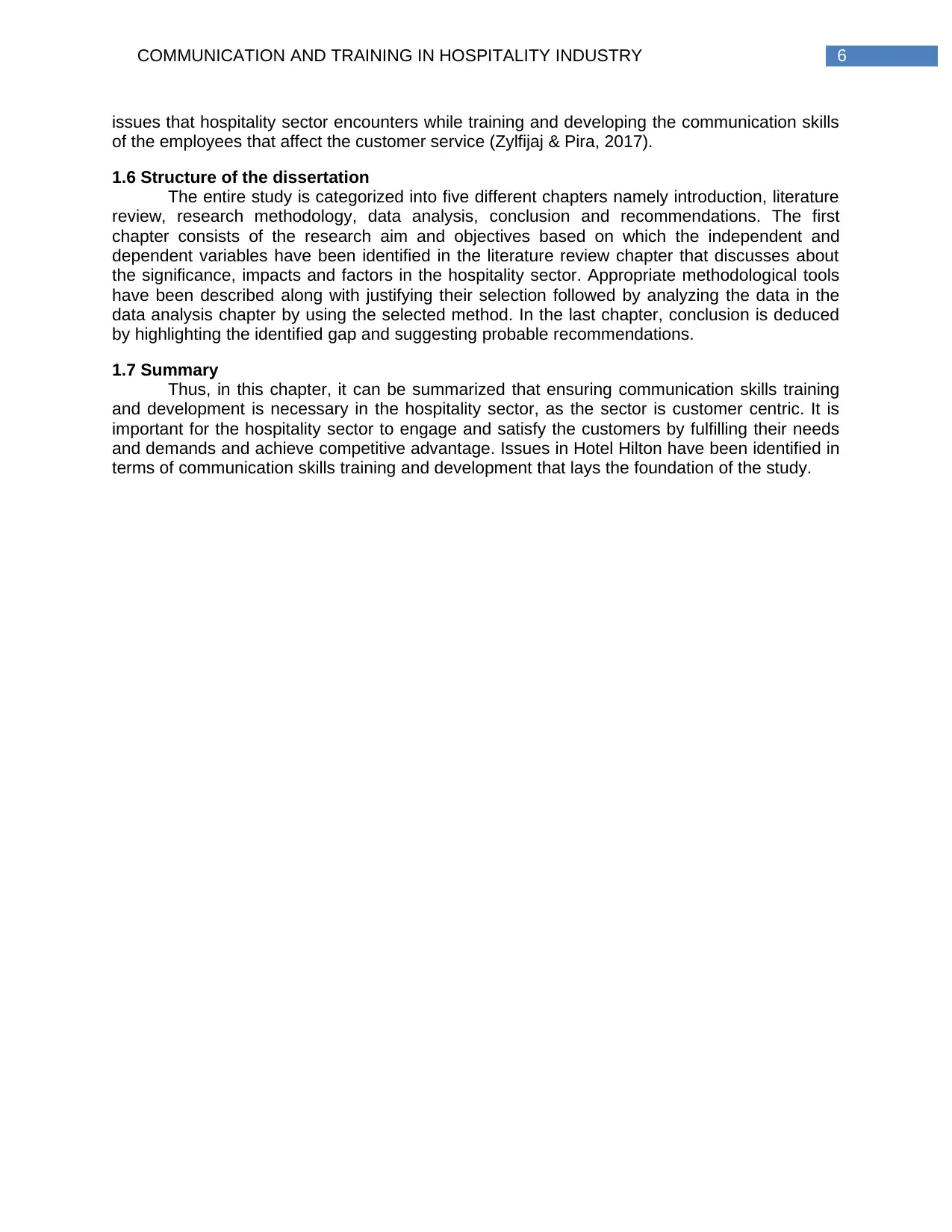
6COMMUNICATION AND TRAINING IN HOSPITALITY INDUSTRY
issues that hospitality sector encounters while training and developing the communication skills
of the employees that affect the customer service (Zylfijaj & Pira, 2017).
1.6 Structure of the dissertation
The entire study is categorized into five different chapters namely introduction, literature
review, research methodology, data analysis, conclusion and recommendations. The first
chapter consists of the research aim and objectives based on which the independent and
dependent variables have been identified in the literature review chapter that discusses about
the significance, impacts and factors in the hospitality sector. Appropriate methodological tools
have been described along with justifying their selection followed by analyzing the data in the
data analysis chapter by using the selected method. In the last chapter, conclusion is deduced
by highlighting the identified gap and suggesting probable recommendations.
1.7 Summary
Thus, in this chapter, it can be summarized that ensuring communication skills training
and development is necessary in the hospitality sector, as the sector is customer centric. It is
important for the hospitality sector to engage and satisfy the customers by fulfilling their needs
and demands and achieve competitive advantage. Issues in Hotel Hilton have been identified in
terms of communication skills training and development that lays the foundation of the study.
issues that hospitality sector encounters while training and developing the communication skills
of the employees that affect the customer service (Zylfijaj & Pira, 2017).
1.6 Structure of the dissertation
The entire study is categorized into five different chapters namely introduction, literature
review, research methodology, data analysis, conclusion and recommendations. The first
chapter consists of the research aim and objectives based on which the independent and
dependent variables have been identified in the literature review chapter that discusses about
the significance, impacts and factors in the hospitality sector. Appropriate methodological tools
have been described along with justifying their selection followed by analyzing the data in the
data analysis chapter by using the selected method. In the last chapter, conclusion is deduced
by highlighting the identified gap and suggesting probable recommendations.
1.7 Summary
Thus, in this chapter, it can be summarized that ensuring communication skills training
and development is necessary in the hospitality sector, as the sector is customer centric. It is
important for the hospitality sector to engage and satisfy the customers by fulfilling their needs
and demands and achieve competitive advantage. Issues in Hotel Hilton have been identified in
terms of communication skills training and development that lays the foundation of the study.
Paraphrase This Document
Need a fresh take? Get an instant paraphrase of this document with our AI Paraphraser
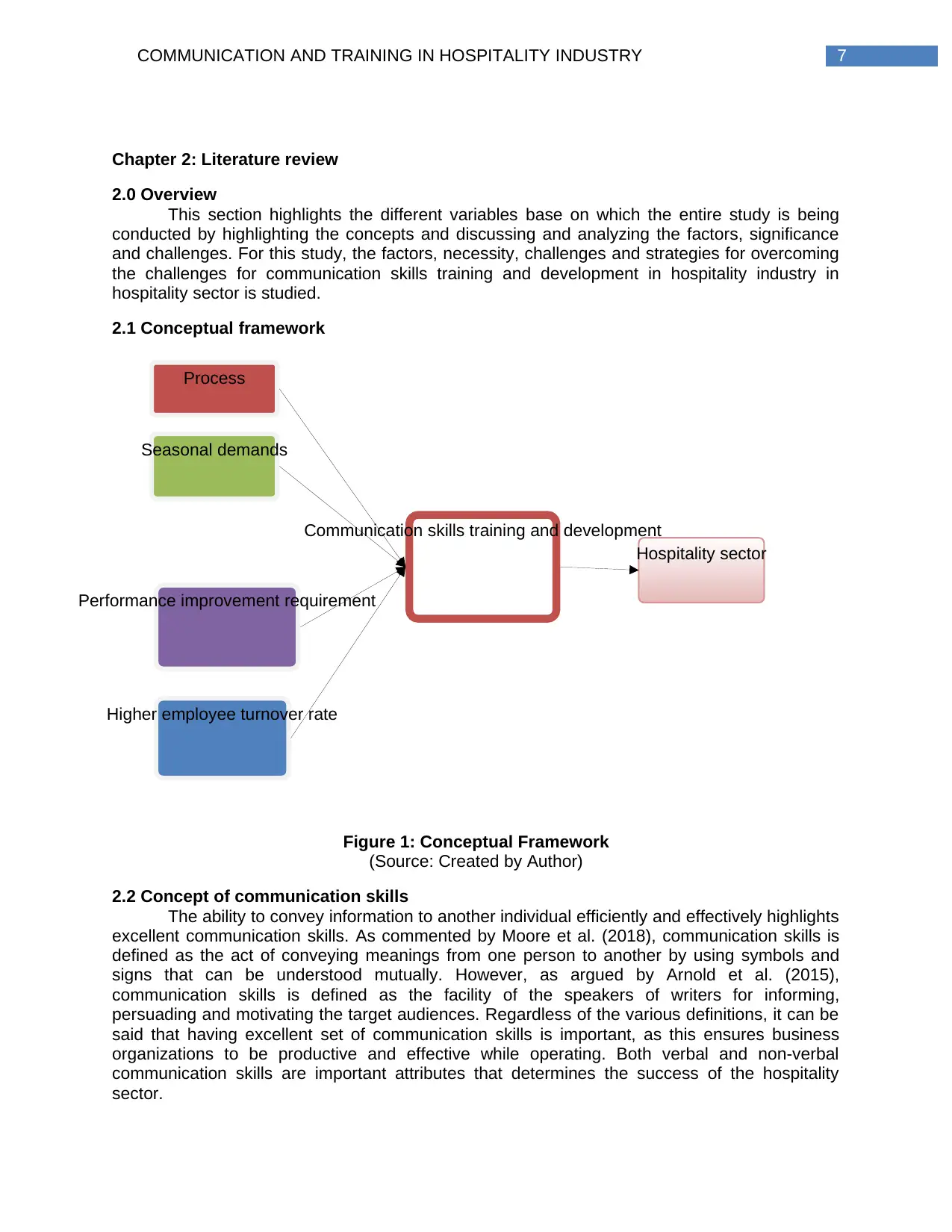
Communication skills training and development
Hospitality sector
Process
Seasonal demands
Performance improvement requirement
Higher employee turnover rate
7COMMUNICATION AND TRAINING IN HOSPITALITY INDUSTRY
Chapter 2: Literature review
2.0 Overview
This section highlights the different variables base on which the entire study is being
conducted by highlighting the concepts and discussing and analyzing the factors, significance
and challenges. For this study, the factors, necessity, challenges and strategies for overcoming
the challenges for communication skills training and development in hospitality industry in
hospitality sector is studied.
2.1 Conceptual framework
Figure 1: Conceptual Framework
(Source: Created by Author)
2.2 Concept of communication skills
The ability to convey information to another individual efficiently and effectively highlights
excellent communication skills. As commented by Moore et al. (2018), communication skills is
defined as the act of conveying meanings from one person to another by using symbols and
signs that can be understood mutually. However, as argued by Arnold et al. (2015),
communication skills is defined as the facility of the speakers of writers for informing,
persuading and motivating the target audiences. Regardless of the various definitions, it can be
said that having excellent set of communication skills is important, as this ensures business
organizations to be productive and effective while operating. Both verbal and non-verbal
communication skills are important attributes that determines the success of the hospitality
sector.
Hospitality sector
Process
Seasonal demands
Performance improvement requirement
Higher employee turnover rate
7COMMUNICATION AND TRAINING IN HOSPITALITY INDUSTRY
Chapter 2: Literature review
2.0 Overview
This section highlights the different variables base on which the entire study is being
conducted by highlighting the concepts and discussing and analyzing the factors, significance
and challenges. For this study, the factors, necessity, challenges and strategies for overcoming
the challenges for communication skills training and development in hospitality industry in
hospitality sector is studied.
2.1 Conceptual framework
Figure 1: Conceptual Framework
(Source: Created by Author)
2.2 Concept of communication skills
The ability to convey information to another individual efficiently and effectively highlights
excellent communication skills. As commented by Moore et al. (2018), communication skills is
defined as the act of conveying meanings from one person to another by using symbols and
signs that can be understood mutually. However, as argued by Arnold et al. (2015),
communication skills is defined as the facility of the speakers of writers for informing,
persuading and motivating the target audiences. Regardless of the various definitions, it can be
said that having excellent set of communication skills is important, as this ensures business
organizations to be productive and effective while operating. Both verbal and non-verbal
communication skills are important attributes that determines the success of the hospitality
sector.
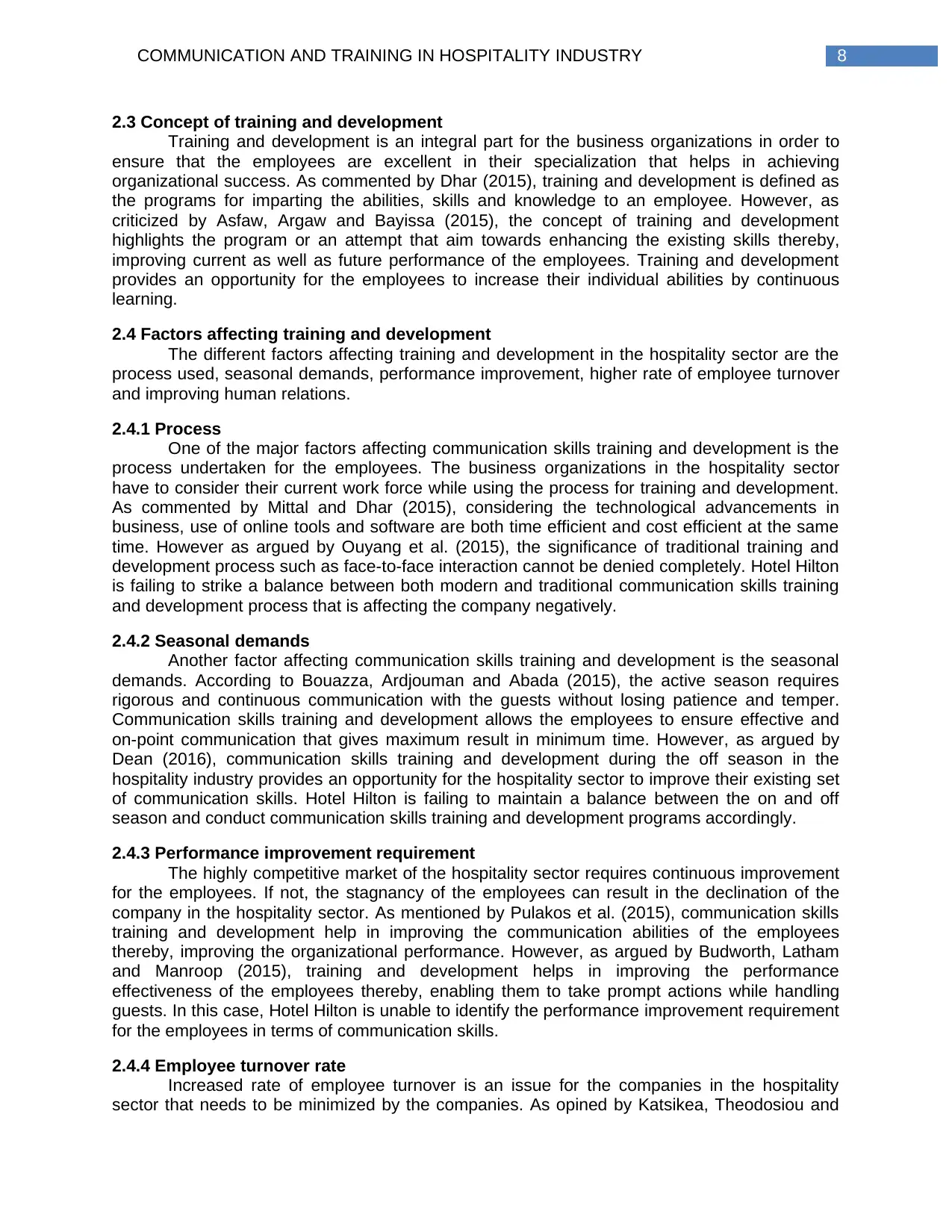
8COMMUNICATION AND TRAINING IN HOSPITALITY INDUSTRY
2.3 Concept of training and development
Training and development is an integral part for the business organizations in order to
ensure that the employees are excellent in their specialization that helps in achieving
organizational success. As commented by Dhar (2015), training and development is defined as
the programs for imparting the abilities, skills and knowledge to an employee. However, as
criticized by Asfaw, Argaw and Bayissa (2015), the concept of training and development
highlights the program or an attempt that aim towards enhancing the existing skills thereby,
improving current as well as future performance of the employees. Training and development
provides an opportunity for the employees to increase their individual abilities by continuous
learning.
2.4 Factors affecting training and development
The different factors affecting training and development in the hospitality sector are the
process used, seasonal demands, performance improvement, higher rate of employee turnover
and improving human relations.
2.4.1 Process
One of the major factors affecting communication skills training and development is the
process undertaken for the employees. The business organizations in the hospitality sector
have to consider their current work force while using the process for training and development.
As commented by Mittal and Dhar (2015), considering the technological advancements in
business, use of online tools and software are both time efficient and cost efficient at the same
time. However as argued by Ouyang et al. (2015), the significance of traditional training and
development process such as face-to-face interaction cannot be denied completely. Hotel Hilton
is failing to strike a balance between both modern and traditional communication skills training
and development process that is affecting the company negatively.
2.4.2 Seasonal demands
Another factor affecting communication skills training and development is the seasonal
demands. According to Bouazza, Ardjouman and Abada (2015), the active season requires
rigorous and continuous communication with the guests without losing patience and temper.
Communication skills training and development allows the employees to ensure effective and
on-point communication that gives maximum result in minimum time. However, as argued by
Dean (2016), communication skills training and development during the off season in the
hospitality industry provides an opportunity for the hospitality sector to improve their existing set
of communication skills. Hotel Hilton is failing to maintain a balance between the on and off
season and conduct communication skills training and development programs accordingly.
2.4.3 Performance improvement requirement
The highly competitive market of the hospitality sector requires continuous improvement
for the employees. If not, the stagnancy of the employees can result in the declination of the
company in the hospitality sector. As mentioned by Pulakos et al. (2015), communication skills
training and development help in improving the communication abilities of the employees
thereby, improving the organizational performance. However, as argued by Budworth, Latham
and Manroop (2015), training and development helps in improving the performance
effectiveness of the employees thereby, enabling them to take prompt actions while handling
guests. In this case, Hotel Hilton is unable to identify the performance improvement requirement
for the employees in terms of communication skills.
2.4.4 Employee turnover rate
Increased rate of employee turnover is an issue for the companies in the hospitality
sector that needs to be minimized by the companies. As opined by Katsikea, Theodosiou and
2.3 Concept of training and development
Training and development is an integral part for the business organizations in order to
ensure that the employees are excellent in their specialization that helps in achieving
organizational success. As commented by Dhar (2015), training and development is defined as
the programs for imparting the abilities, skills and knowledge to an employee. However, as
criticized by Asfaw, Argaw and Bayissa (2015), the concept of training and development
highlights the program or an attempt that aim towards enhancing the existing skills thereby,
improving current as well as future performance of the employees. Training and development
provides an opportunity for the employees to increase their individual abilities by continuous
learning.
2.4 Factors affecting training and development
The different factors affecting training and development in the hospitality sector are the
process used, seasonal demands, performance improvement, higher rate of employee turnover
and improving human relations.
2.4.1 Process
One of the major factors affecting communication skills training and development is the
process undertaken for the employees. The business organizations in the hospitality sector
have to consider their current work force while using the process for training and development.
As commented by Mittal and Dhar (2015), considering the technological advancements in
business, use of online tools and software are both time efficient and cost efficient at the same
time. However as argued by Ouyang et al. (2015), the significance of traditional training and
development process such as face-to-face interaction cannot be denied completely. Hotel Hilton
is failing to strike a balance between both modern and traditional communication skills training
and development process that is affecting the company negatively.
2.4.2 Seasonal demands
Another factor affecting communication skills training and development is the seasonal
demands. According to Bouazza, Ardjouman and Abada (2015), the active season requires
rigorous and continuous communication with the guests without losing patience and temper.
Communication skills training and development allows the employees to ensure effective and
on-point communication that gives maximum result in minimum time. However, as argued by
Dean (2016), communication skills training and development during the off season in the
hospitality industry provides an opportunity for the hospitality sector to improve their existing set
of communication skills. Hotel Hilton is failing to maintain a balance between the on and off
season and conduct communication skills training and development programs accordingly.
2.4.3 Performance improvement requirement
The highly competitive market of the hospitality sector requires continuous improvement
for the employees. If not, the stagnancy of the employees can result in the declination of the
company in the hospitality sector. As mentioned by Pulakos et al. (2015), communication skills
training and development help in improving the communication abilities of the employees
thereby, improving the organizational performance. However, as argued by Budworth, Latham
and Manroop (2015), training and development helps in improving the performance
effectiveness of the employees thereby, enabling them to take prompt actions while handling
guests. In this case, Hotel Hilton is unable to identify the performance improvement requirement
for the employees in terms of communication skills.
2.4.4 Employee turnover rate
Increased rate of employee turnover is an issue for the companies in the hospitality
sector that needs to be minimized by the companies. As opined by Katsikea, Theodosiou and
⊘ This is a preview!⊘
Do you want full access?
Subscribe today to unlock all pages.

Trusted by 1+ million students worldwide
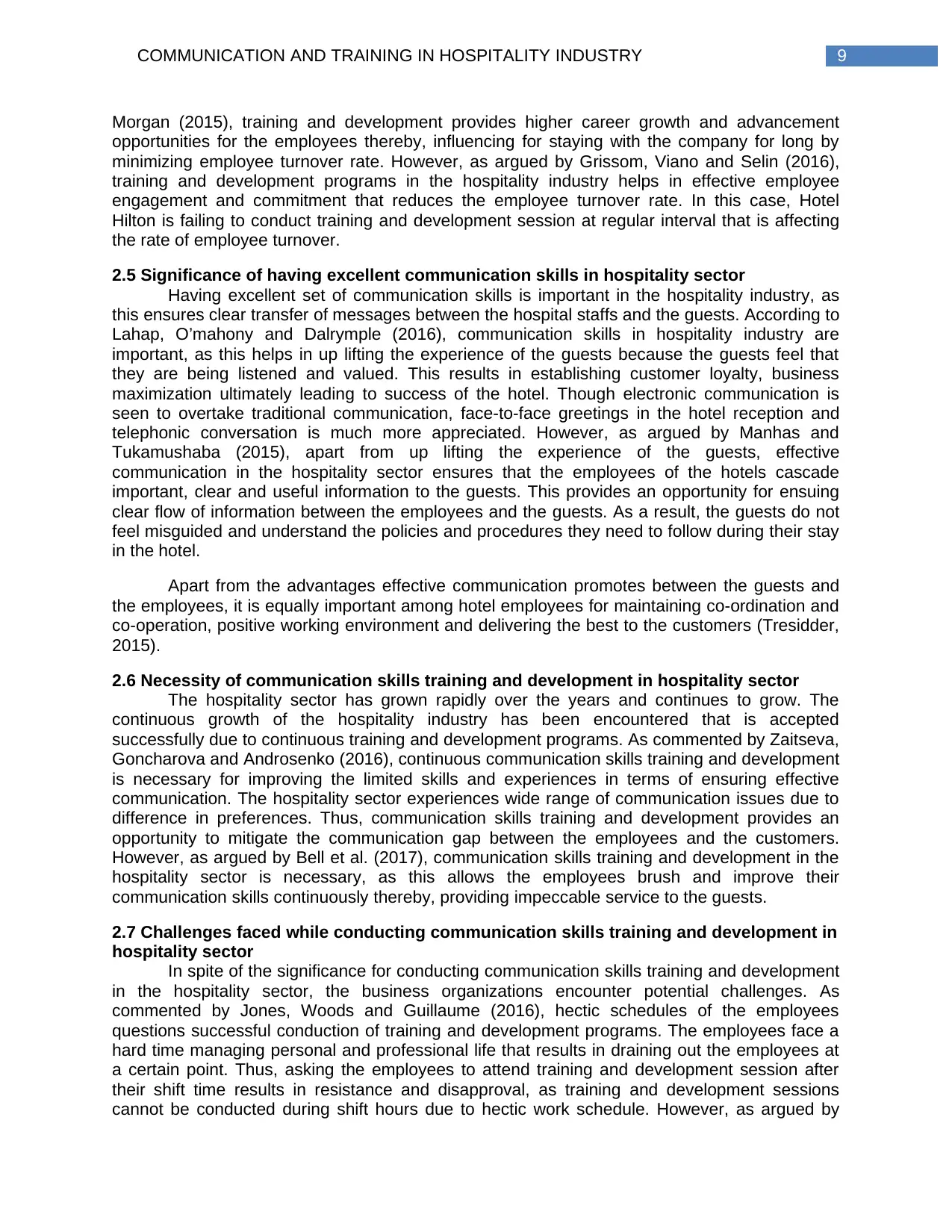
9COMMUNICATION AND TRAINING IN HOSPITALITY INDUSTRY
Morgan (2015), training and development provides higher career growth and advancement
opportunities for the employees thereby, influencing for staying with the company for long by
minimizing employee turnover rate. However, as argued by Grissom, Viano and Selin (2016),
training and development programs in the hospitality industry helps in effective employee
engagement and commitment that reduces the employee turnover rate. In this case, Hotel
Hilton is failing to conduct training and development session at regular interval that is affecting
the rate of employee turnover.
2.5 Significance of having excellent communication skills in hospitality sector
Having excellent set of communication skills is important in the hospitality industry, as
this ensures clear transfer of messages between the hospital staffs and the guests. According to
Lahap, O’mahony and Dalrymple (2016), communication skills in hospitality industry are
important, as this helps in up lifting the experience of the guests because the guests feel that
they are being listened and valued. This results in establishing customer loyalty, business
maximization ultimately leading to success of the hotel. Though electronic communication is
seen to overtake traditional communication, face-to-face greetings in the hotel reception and
telephonic conversation is much more appreciated. However, as argued by Manhas and
Tukamushaba (2015), apart from up lifting the experience of the guests, effective
communication in the hospitality sector ensures that the employees of the hotels cascade
important, clear and useful information to the guests. This provides an opportunity for ensuing
clear flow of information between the employees and the guests. As a result, the guests do not
feel misguided and understand the policies and procedures they need to follow during their stay
in the hotel.
Apart from the advantages effective communication promotes between the guests and
the employees, it is equally important among hotel employees for maintaining co-ordination and
co-operation, positive working environment and delivering the best to the customers (Tresidder,
2015).
2.6 Necessity of communication skills training and development in hospitality sector
The hospitality sector has grown rapidly over the years and continues to grow. The
continuous growth of the hospitality industry has been encountered that is accepted
successfully due to continuous training and development programs. As commented by Zaitseva,
Goncharova and Androsenko (2016), continuous communication skills training and development
is necessary for improving the limited skills and experiences in terms of ensuring effective
communication. The hospitality sector experiences wide range of communication issues due to
difference in preferences. Thus, communication skills training and development provides an
opportunity to mitigate the communication gap between the employees and the customers.
However, as argued by Bell et al. (2017), communication skills training and development in the
hospitality sector is necessary, as this allows the employees brush and improve their
communication skills continuously thereby, providing impeccable service to the guests.
2.7 Challenges faced while conducting communication skills training and development in
hospitality sector
In spite of the significance for conducting communication skills training and development
in the hospitality sector, the business organizations encounter potential challenges. As
commented by Jones, Woods and Guillaume (2016), hectic schedules of the employees
questions successful conduction of training and development programs. The employees face a
hard time managing personal and professional life that results in draining out the employees at
a certain point. Thus, asking the employees to attend training and development session after
their shift time results in resistance and disapproval, as training and development sessions
cannot be conducted during shift hours due to hectic work schedule. However, as argued by
Morgan (2015), training and development provides higher career growth and advancement
opportunities for the employees thereby, influencing for staying with the company for long by
minimizing employee turnover rate. However, as argued by Grissom, Viano and Selin (2016),
training and development programs in the hospitality industry helps in effective employee
engagement and commitment that reduces the employee turnover rate. In this case, Hotel
Hilton is failing to conduct training and development session at regular interval that is affecting
the rate of employee turnover.
2.5 Significance of having excellent communication skills in hospitality sector
Having excellent set of communication skills is important in the hospitality industry, as
this ensures clear transfer of messages between the hospital staffs and the guests. According to
Lahap, O’mahony and Dalrymple (2016), communication skills in hospitality industry are
important, as this helps in up lifting the experience of the guests because the guests feel that
they are being listened and valued. This results in establishing customer loyalty, business
maximization ultimately leading to success of the hotel. Though electronic communication is
seen to overtake traditional communication, face-to-face greetings in the hotel reception and
telephonic conversation is much more appreciated. However, as argued by Manhas and
Tukamushaba (2015), apart from up lifting the experience of the guests, effective
communication in the hospitality sector ensures that the employees of the hotels cascade
important, clear and useful information to the guests. This provides an opportunity for ensuing
clear flow of information between the employees and the guests. As a result, the guests do not
feel misguided and understand the policies and procedures they need to follow during their stay
in the hotel.
Apart from the advantages effective communication promotes between the guests and
the employees, it is equally important among hotel employees for maintaining co-ordination and
co-operation, positive working environment and delivering the best to the customers (Tresidder,
2015).
2.6 Necessity of communication skills training and development in hospitality sector
The hospitality sector has grown rapidly over the years and continues to grow. The
continuous growth of the hospitality industry has been encountered that is accepted
successfully due to continuous training and development programs. As commented by Zaitseva,
Goncharova and Androsenko (2016), continuous communication skills training and development
is necessary for improving the limited skills and experiences in terms of ensuring effective
communication. The hospitality sector experiences wide range of communication issues due to
difference in preferences. Thus, communication skills training and development provides an
opportunity to mitigate the communication gap between the employees and the customers.
However, as argued by Bell et al. (2017), communication skills training and development in the
hospitality sector is necessary, as this allows the employees brush and improve their
communication skills continuously thereby, providing impeccable service to the guests.
2.7 Challenges faced while conducting communication skills training and development in
hospitality sector
In spite of the significance for conducting communication skills training and development
in the hospitality sector, the business organizations encounter potential challenges. As
commented by Jones, Woods and Guillaume (2016), hectic schedules of the employees
questions successful conduction of training and development programs. The employees face a
hard time managing personal and professional life that results in draining out the employees at
a certain point. Thus, asking the employees to attend training and development session after
their shift time results in resistance and disapproval, as training and development sessions
cannot be conducted during shift hours due to hectic work schedule. However, as argued by
Paraphrase This Document
Need a fresh take? Get an instant paraphrase of this document with our AI Paraphraser
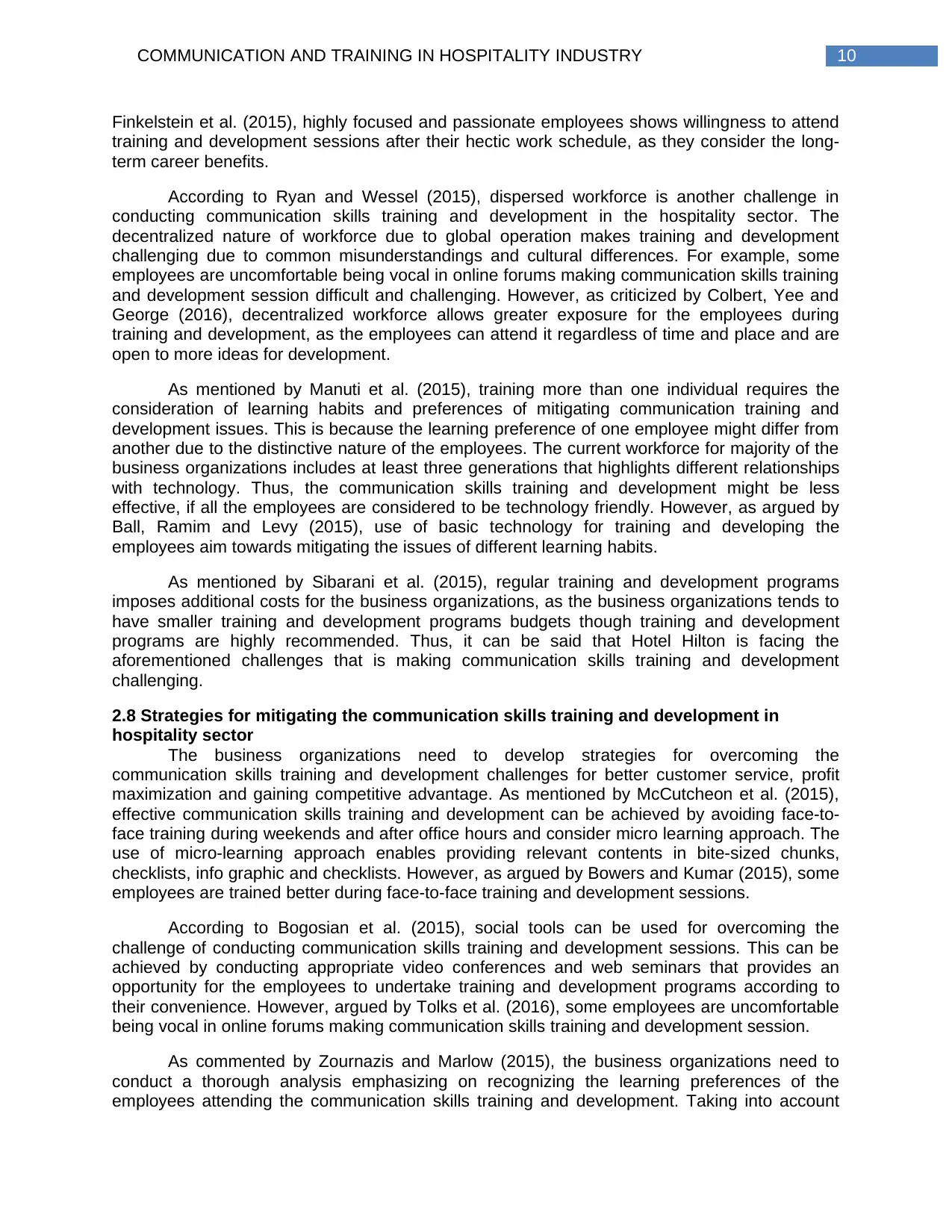
10COMMUNICATION AND TRAINING IN HOSPITALITY INDUSTRY
Finkelstein et al. (2015), highly focused and passionate employees shows willingness to attend
training and development sessions after their hectic work schedule, as they consider the long-
term career benefits.
According to Ryan and Wessel (2015), dispersed workforce is another challenge in
conducting communication skills training and development in the hospitality sector. The
decentralized nature of workforce due to global operation makes training and development
challenging due to common misunderstandings and cultural differences. For example, some
employees are uncomfortable being vocal in online forums making communication skills training
and development session difficult and challenging. However, as criticized by Colbert, Yee and
George (2016), decentralized workforce allows greater exposure for the employees during
training and development, as the employees can attend it regardless of time and place and are
open to more ideas for development.
As mentioned by Manuti et al. (2015), training more than one individual requires the
consideration of learning habits and preferences of mitigating communication training and
development issues. This is because the learning preference of one employee might differ from
another due to the distinctive nature of the employees. The current workforce for majority of the
business organizations includes at least three generations that highlights different relationships
with technology. Thus, the communication skills training and development might be less
effective, if all the employees are considered to be technology friendly. However, as argued by
Ball, Ramim and Levy (2015), use of basic technology for training and developing the
employees aim towards mitigating the issues of different learning habits.
As mentioned by Sibarani et al. (2015), regular training and development programs
imposes additional costs for the business organizations, as the business organizations tends to
have smaller training and development programs budgets though training and development
programs are highly recommended. Thus, it can be said that Hotel Hilton is facing the
aforementioned challenges that is making communication skills training and development
challenging.
2.8 Strategies for mitigating the communication skills training and development in
hospitality sector
The business organizations need to develop strategies for overcoming the
communication skills training and development challenges for better customer service, profit
maximization and gaining competitive advantage. As mentioned by McCutcheon et al. (2015),
effective communication skills training and development can be achieved by avoiding face-to-
face training during weekends and after office hours and consider micro learning approach. The
use of micro-learning approach enables providing relevant contents in bite-sized chunks,
checklists, info graphic and checklists. However, as argued by Bowers and Kumar (2015), some
employees are trained better during face-to-face training and development sessions.
According to Bogosian et al. (2015), social tools can be used for overcoming the
challenge of conducting communication skills training and development sessions. This can be
achieved by conducting appropriate video conferences and web seminars that provides an
opportunity for the employees to undertake training and development programs according to
their convenience. However, argued by Tolks et al. (2016), some employees are uncomfortable
being vocal in online forums making communication skills training and development session.
As commented by Zournazis and Marlow (2015), the business organizations need to
conduct a thorough analysis emphasizing on recognizing the learning preferences of the
employees attending the communication skills training and development. Taking into account
Finkelstein et al. (2015), highly focused and passionate employees shows willingness to attend
training and development sessions after their hectic work schedule, as they consider the long-
term career benefits.
According to Ryan and Wessel (2015), dispersed workforce is another challenge in
conducting communication skills training and development in the hospitality sector. The
decentralized nature of workforce due to global operation makes training and development
challenging due to common misunderstandings and cultural differences. For example, some
employees are uncomfortable being vocal in online forums making communication skills training
and development session difficult and challenging. However, as criticized by Colbert, Yee and
George (2016), decentralized workforce allows greater exposure for the employees during
training and development, as the employees can attend it regardless of time and place and are
open to more ideas for development.
As mentioned by Manuti et al. (2015), training more than one individual requires the
consideration of learning habits and preferences of mitigating communication training and
development issues. This is because the learning preference of one employee might differ from
another due to the distinctive nature of the employees. The current workforce for majority of the
business organizations includes at least three generations that highlights different relationships
with technology. Thus, the communication skills training and development might be less
effective, if all the employees are considered to be technology friendly. However, as argued by
Ball, Ramim and Levy (2015), use of basic technology for training and developing the
employees aim towards mitigating the issues of different learning habits.
As mentioned by Sibarani et al. (2015), regular training and development programs
imposes additional costs for the business organizations, as the business organizations tends to
have smaller training and development programs budgets though training and development
programs are highly recommended. Thus, it can be said that Hotel Hilton is facing the
aforementioned challenges that is making communication skills training and development
challenging.
2.8 Strategies for mitigating the communication skills training and development in
hospitality sector
The business organizations need to develop strategies for overcoming the
communication skills training and development challenges for better customer service, profit
maximization and gaining competitive advantage. As mentioned by McCutcheon et al. (2015),
effective communication skills training and development can be achieved by avoiding face-to-
face training during weekends and after office hours and consider micro learning approach. The
use of micro-learning approach enables providing relevant contents in bite-sized chunks,
checklists, info graphic and checklists. However, as argued by Bowers and Kumar (2015), some
employees are trained better during face-to-face training and development sessions.
According to Bogosian et al. (2015), social tools can be used for overcoming the
challenge of conducting communication skills training and development sessions. This can be
achieved by conducting appropriate video conferences and web seminars that provides an
opportunity for the employees to undertake training and development programs according to
their convenience. However, argued by Tolks et al. (2016), some employees are uncomfortable
being vocal in online forums making communication skills training and development session.
As commented by Zournazis and Marlow (2015), the business organizations need to
conduct a thorough analysis emphasizing on recognizing the learning preferences of the
employees attending the communication skills training and development. Taking into account
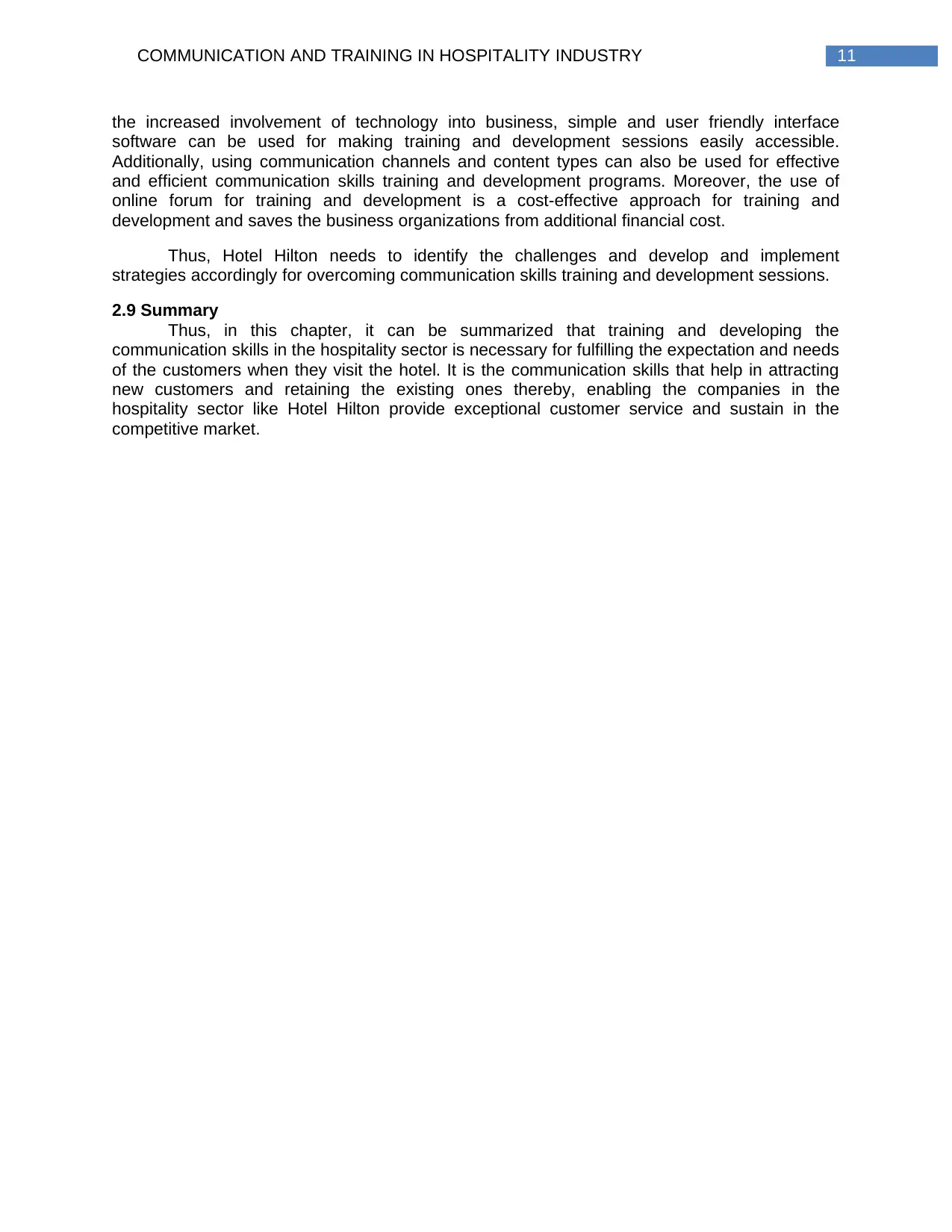
11COMMUNICATION AND TRAINING IN HOSPITALITY INDUSTRY
the increased involvement of technology into business, simple and user friendly interface
software can be used for making training and development sessions easily accessible.
Additionally, using communication channels and content types can also be used for effective
and efficient communication skills training and development programs. Moreover, the use of
online forum for training and development is a cost-effective approach for training and
development and saves the business organizations from additional financial cost.
Thus, Hotel Hilton needs to identify the challenges and develop and implement
strategies accordingly for overcoming communication skills training and development sessions.
2.9 Summary
Thus, in this chapter, it can be summarized that training and developing the
communication skills in the hospitality sector is necessary for fulfilling the expectation and needs
of the customers when they visit the hotel. It is the communication skills that help in attracting
new customers and retaining the existing ones thereby, enabling the companies in the
hospitality sector like Hotel Hilton provide exceptional customer service and sustain in the
competitive market.
the increased involvement of technology into business, simple and user friendly interface
software can be used for making training and development sessions easily accessible.
Additionally, using communication channels and content types can also be used for effective
and efficient communication skills training and development programs. Moreover, the use of
online forum for training and development is a cost-effective approach for training and
development and saves the business organizations from additional financial cost.
Thus, Hotel Hilton needs to identify the challenges and develop and implement
strategies accordingly for overcoming communication skills training and development sessions.
2.9 Summary
Thus, in this chapter, it can be summarized that training and developing the
communication skills in the hospitality sector is necessary for fulfilling the expectation and needs
of the customers when they visit the hotel. It is the communication skills that help in attracting
new customers and retaining the existing ones thereby, enabling the companies in the
hospitality sector like Hotel Hilton provide exceptional customer service and sustain in the
competitive market.
⊘ This is a preview!⊘
Do you want full access?
Subscribe today to unlock all pages.

Trusted by 1+ million students worldwide
1 out of 30
Related Documents
Your All-in-One AI-Powered Toolkit for Academic Success.
+13062052269
info@desklib.com
Available 24*7 on WhatsApp / Email
![[object Object]](/_next/static/media/star-bottom.7253800d.svg)
Unlock your academic potential
Copyright © 2020–2026 A2Z Services. All Rights Reserved. Developed and managed by ZUCOL.





